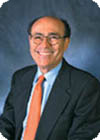Although he has held enough high-profile positions for several business careers, Robert Potter '54 shows no signs of slowing down. Last November, he became chairman of Tatum CIO Partners, a new group of about 50 experienced executives working as chief information officers in six major cities. Since January, the partnership has served over 25 clients, who select CIO's from its membership. The partners benefit by receiving 75 percent of client fees, access to peers for problem-solving assistance, and stability in a position that otherwise experiences rapid turnover due to mergers, acquisitions, and companies going public.
“Whether you're a lollypop manufacturer, oil well driller, or department store, the information about your business is a valuable asset,” says Potter. “If you don't have a very competent person to manage that information, you'll lose the value of that asset.”
Chairman of Tatum CIO is one of many roles that Potter fills as head of R.J. Potter Co., which provides consulting services to technology firms. Clients have included Rupert Murdoch and retired Dallas Cowboys quarterback Roger Staubach. In April, he joined the board of directors of Cree, Inc., a Durham, N.C., manufacturer of semiconductor materials and devices, including blue LED's. For about 20 years, he has served on the board of directors of Molex, Inc., a global manufacturer of over 100,000 electronic, electrical, and fiber-optic interconnection products with annual sales of $2.2 billion. “I like to stay on the leading edge of technically rich businesses,” he says.
Previous positions have included president and CEO of Datapoint, group vice president of Nortel Networks, senior vice president and chief technical officer of International Harvester, and president of Office Systems Division, Xerox. Potter is also a trustee of the Illinois Institute of Technology.
At Lafayette, Potter was a Phi Beta Kappa and honors graduate in physics, receiving a “very strong technical education.” As a student, he ran his own photography business. He published the first thesis in the United States about fiber optics while earning a Ph.D. in optical physics from University of Rochester.

